-
 New protests hit Iran as alarm grows over crackdown 'massacre'
New protests hit Iran as alarm grows over crackdown 'massacre'
-
Svitolina powers to Auckland title in Australian Open warm-up

-
 Keys draws on happy Adelaide memories before Australian Open defence
Keys draws on happy Adelaide memories before Australian Open defence
-
Scores of homes razed, one dead in Australian bushfires

-
 Ugandan opposition turns national flag into protest symbol
Ugandan opposition turns national flag into protest symbol
-
Bears banish Packers, Rams survive Panthers playoff scare

-
 'Quad God' Malinin warms up for Olympics with US skating crown
'Quad God' Malinin warms up for Olympics with US skating crown
-
India eyes new markets with US trade deal limbo
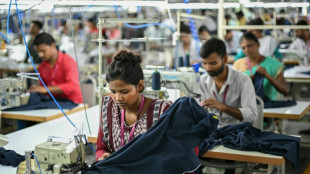
-
 Syria's Kurdish fighters agree to leave Aleppo after deadly clashes
Syria's Kurdish fighters agree to leave Aleppo after deadly clashes
-
New York's Chrysler Building, an art deco jewel, seeks new owner
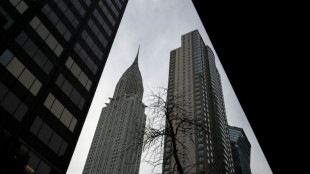
-
 AI toys look for bright side after troubled start
AI toys look for bright side after troubled start
-
AI pendants back in vogue at tech show after early setback

-
 Grateful Dead co-founder and guitarist Bob Weir dies aged 78
Grateful Dead co-founder and guitarist Bob Weir dies aged 78
-
Myanmar votes in second phase of junta-run election

-
 'One Battle After Another' heads into Golden Globes as favorite
'One Battle After Another' heads into Golden Globes as favorite
-
Rams survive Panthers scare to advance in NFL playoffs

-
 Rallies across US after woman shot and killed by immigration agent
Rallies across US after woman shot and killed by immigration agent
-
Egypt dump out holders Ivory Coast as Nigeria set up AFCON semi with Morocco

-
 Rosenior salutes 'outstanding' start to Chelsea reign
Rosenior salutes 'outstanding' start to Chelsea reign
-
Maduro loyalists stage modest rally as Venezuelan govt courts US

-
 Rosenior makes flying start as Chelsea rout Charlton in FA Cup
Rosenior makes flying start as Chelsea rout Charlton in FA Cup
-
Rallies across US against shooting of woman by immigration agent

-
 Salah closer to AFCON glory as Egypt dethrone champions Ivory Coast
Salah closer to AFCON glory as Egypt dethrone champions Ivory Coast
-
O'Neil ends 'crazy three days' with Strasbourg cup canter
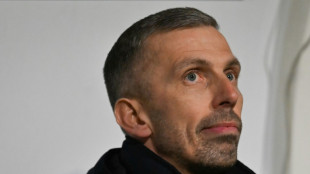
-
 Mitchell leads Cavs over T-Wolves
Mitchell leads Cavs over T-Wolves
-
O'Neil ends 'crazy few days' with Strasbourg cup canter
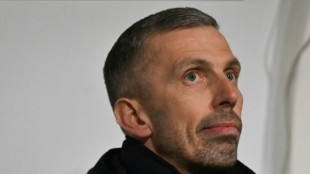
-
 Argentina wildfire burns over 5,500 hectares: governor
Argentina wildfire burns over 5,500 hectares: governor
-
Byrne late penalty fires Leinster into Champions Cup last 16

-
 Roma beat Sassuolo to close in on Serie A leaders Inter
Roma beat Sassuolo to close in on Serie A leaders Inter
-
Villa's FA Cup win at Spurs leaves Frank on the brink

-
 Osimhen focused on Nigeria glory not scoring record
Osimhen focused on Nigeria glory not scoring record
-
Undav calls shots as Stuttgart thump Leverkusen

-
 Venezuelan prisoners smile to hear of Maduro's fall
Venezuelan prisoners smile to hear of Maduro's fall
-
Thousands of Irish, French farmers protest EU-Mercosur trade deal

-
 Kiplimo captures third straight world cross country title
Kiplimo captures third straight world cross country title
-
Osimhen leads Nigeria past Algeria into AFCON semi-finals

-
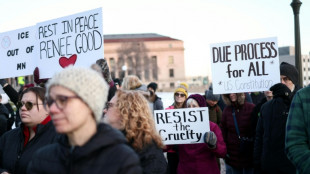 Weekend of US protests after woman killed by immigration agent
Weekend of US protests after woman killed by immigration agent
-
Monaco cling on with 10 men to avoid French Cup shock

-
 Rooney close to tears as brother masterminds FA Cup history
Rooney close to tears as brother masterminds FA Cup history
-
Semenyo scores on Man City debut in 10-goal rout of Exeter

-
 Villarreal sink Alaves to stay in La Liga hunt
Villarreal sink Alaves to stay in La Liga hunt
-
Bristol, Glasgow reach Champions Cup last 16

-
 Freiburg beat 10-man Hamburg to climb to eighth in the Bundesliga
Freiburg beat 10-man Hamburg to climb to eighth in the Bundesliga
-
Venezuela loyalists to rally one week after Maduro's capture
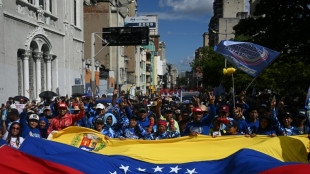
-
 Football: Five memorable FA Cup upsets
Football: Five memorable FA Cup upsets
-
Odermatt warms up for Winter Games with Adelboden giant slalom win

-
 Benin showcases culture with Vodun Days
Benin showcases culture with Vodun Days
-
Holders Crystal Palace stunned by Macclesfield in biggest ever FA Cup shock

-
 Odermatt wins Abelboden giant slalom for sixth World Cup success of season
Odermatt wins Abelboden giant slalom for sixth World Cup success of season
-
Poland reach United Cup final despite Swiatek loss to Gauff

France's debt is growing
France is facing an unprecedented financial challenge. With public debt exceeding €3.2 trillion, representing more than 110% of gross domestic product (GDP), the eurozone's second-largest economy is on a dangerous path. The budget deficit is around 5.5% of GDP and is expected to rise to over 6% this year. These figures significantly exceed EU targets, which allow a maximum deficit of 3% and a debt ratio of 60% of GDP. The financial markets are becoming increasingly nervous, and interest rates on French government bonds are climbing to record levels. What has led to this debt chaos, and how can France avoid the looming abyss?
The roots of the crisis run deep. For decades, France has had a relaxed attitude towards debt, which differs from the strict budgetary discipline of other countries such as Germany. During the coronavirus pandemic and the energy crisis resulting from the war in Ukraine, the government pumped billions into the economy to support households and businesses. Subsidies for electricity prices and generous social benefits kept the economy stable but led to a sharp rise in debt. Since 2017, when President Emmanuel Macron took office, public debt has grown by almost one trillion euros. Critics accuse the government of delaying necessary structural reforms, while the government's spending ratio is just under 60% of GDP – one of the highest in the world.
The political situation is exacerbating the crisis. Following early parliamentary elections in the summer of 2024, parliament is fragmented and majorities are difficult to form. Prime Minister François Bayrou, who has been in office since autumn 2024, has presented an ambitious austerity programme to reduce the deficit to below 3% by 2029. The measures include the abolition of two public holidays, a freeze on pensions and social benefits, the elimination of 3,000 civil service jobs and higher taxes on high incomes. However, these plans are meeting with fierce resistance. The right-wing nationalist party Rassemblement National and left-wing parties are threatening votes of no confidence, which could bring down Bayrou's government. His predecessor, Michel Barnier, was forced to resign after only three months in office when his draft budget failed.
The financial markets are watching the situation with suspicion. Interest rates on French government bonds are now exceeding those of Greece in some cases, which is an alarming sign. France spends around 50 billion euros a year on debt servicing alone, and the trend is rising. Experts warn that this figure could climb to between 80 and 90 billion euros by 2027, making investment in education, infrastructure and climate protection virtually impossible. Rating agencies such as S&P and Moody's still rate France's creditworthiness as solid, but have threatened downgrades if the deficits are not reduced.
The crisis also has European dimensions. France is systemically important for the eurozone, and an uncontrolled rise in debt could jeopardise the stability of the single currency. Unlike the Greek debt crisis in 2008, when rescue funds were used, a bailout package for France would be almost impossible to finance. The EU has launched disciplinary proceedings against France to exert pressure for budget consolidation, but political instability is hampering reforms.
What can France do? Bayrou's austerity plans are a first step, but their implementation is uncertain. Tax increases are politically sensitive, as France already has one of the highest tax rates in Europe. Spending cuts could slow economic growth, which is just over 1% this year. At the same time, experts are calling for structural reforms to increase productivity and reduce dependence on the public sector. Without clear political majorities, there is a risk that France will slide further into debt.
Citizens are already feeling the effects of the crisis. Strikes and protests against austerity measures are on the rise, and social tensions are running high. Many French people feel caught between high living costs and impending cuts. The government faces the challenge of regaining credibility without losing the trust of the markets or the population.
A way out of the debt chaos requires courage and a willingness to compromise. Bayrou has described the situation as ‘the last stop before the abyss.’ Whether France can overcome this crisis depends on whether politicians and society are prepared to make tough decisions. Time is pressing, because the financial markets will not tolerate any further delays. France is at a crossroads – between reform and risk.

Canada challenges Trump on Tariffs

Nuclear weapons for Poland against Russia?

Rebellion against Trump: "Ready for War?"

Ukraine: Problem with the ceasefire?

Ukraine Loses Kursk: A Collapse?

Russia's "Alliance" in the Balkans is sinking

US Federal Reserve with “announcement”

Germany doesn't want any more migrants?

Wealth that Brazil is not utilizing!

Taiwan: Is the "Silicon Shield" collapsing?

Next Chancellor of Germany and Trump



